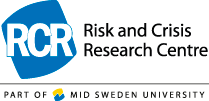Crisis management, organization and collaboration
Crisis management, organization and collaboration is the largest research area in crisis research at RCR and includes both Social Sciences and Information Sciences. A number of projects, past and present, focus on international collaboration, collaboration between different organizations, collaboration between authorities and citizens, situational awareness and management, as well as information systems, information and design, information sharing during crisis and spatial decision support systems.
One example of collaboration between both different disciplines and different organizations is the project Cross-border Collaboration for Safety (GSS), which aims to develop skills, techniques and procedures for joint crisis management and security-threatening situations in the Mid Nordic national border areas. Collaboration is also the focus of two other projects, Multi-organizational collaboration during ordinary crises, which studies the development of situational awareness and situational understanding during ordinary crises between different types of community organizations, and PRACTICE, a FP7 project which aims to improve the preparedness and resilience of the EU member states and associated countries for an attack from a terrorist group using non-conventional weapons such as chemical, biological, radiological or nuclear materials.
Collaboration between organizations and citizens is the focus of the FP7-funded project Public Empowerment Policies, which aims to study crisis management as a coproduction of response organizations and citizens, and a PhD project which aims to increase the understanding of disabled persons’ perceptions of risk related to their social resource endowments, and, more specifically, how municipalities take into consideration the disabled person’s needs in the subsequent risk management planning.

